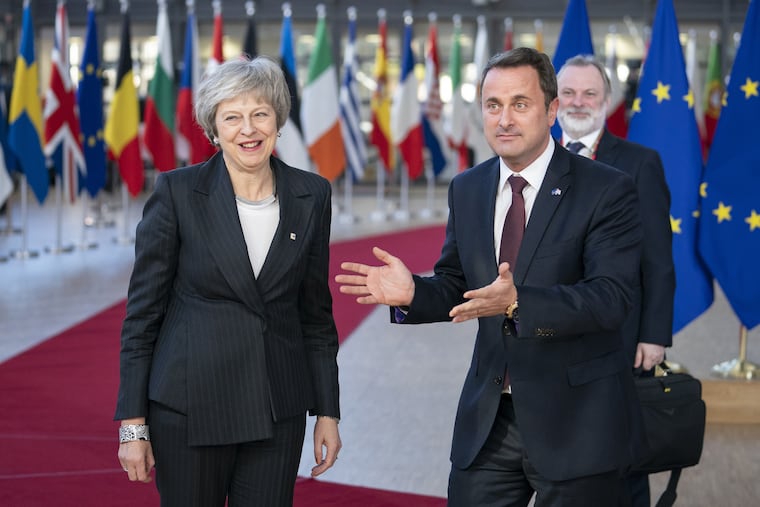As E.U. leaders gather in Brussels over Brexit, Britain’s May says no to reelection
The prime minister agreed to stand down ahead of the 2022 elections as a condition for winning support now to oversee Britain's departure from the EU.

BRUSSELS - British Prime Minister Theresa May said Thursday that she would not seek reelection as she headed to Brussels for a last-ditch effort to convince fellow E.U. leaders to soften the terms of Britain's departure from the European Union.
Hours after she survived a challenge to her leadership from her own rebellious ranks, she told reporters here that she had agreed to stand down ahead of the 2022 elections as a condition for winning support now to oversee Britain's departure from the European Union.
"In my heart I would love to be able to lead the Conservative Party into the next general election, but I think that it is right that the party feels that it would prefer to go into that with a new leader," May said on her way into the summit in Brussels.
"My focus now is on ensuring that I can get those assurances that we need to get this deal over the line because I genuinely believe it's in the best interest of both sides, the U.K. and the E.U., to get a deal over the line, to agree to a deal."
Both sides appeared at an impasse, with the Europeans saying they were willing to give ground on everything except exactly what May is seeking: legal reassurances that Britain would not be locked permanently into a sort of junior-class E.U. membership, subject to many of its rules but unable to sway its decision-making.
And E.U. leaders watching political chaos engulf Britain planned to step up their own emergency preparations in case Britain crashes out of the European Union on March 29 without a deal in place. Diplomats say they believe that is increasingly likely, since the British parliament appears paralyzed by fragmentation, with no clear majority for any single course of action as the clock ticks on Britain's E.U. membership.
May planned to meet Thursday with European Council President Donald Tusk and Irish Prime Minister Leo Varadkar before the summit as she continued to press for language that could win over her restive Brexiteer backbenchers, who feel she has not negotiated a wide enough split from the European Union.
But Europeans said again Thursday that few fundamental changes are possible, even as many welcomed May's political survival, which they see as key to their ability to conclude a deal with Britain.
"At least total chaos has been averted," German Foreign Minister Heiko Maas told Germany's Deutschlandfunk public broadcaster. He said that E.U. leaders were eager to hear proposals from Britain about what could help produce a Brexit deal that will pass muster in Britain's parliament. But he warned that there was little room to reopen the current deal.
"What has been negotiated in the text of the treaty has the consent of all E.U. members," Maas said. "So it will not be easy to convince everyone to change that. We have to assume that the text that is now available is the one to decide on."
May emerged from Wednesday's confidence vote battered but on top. Under Conservative Party rules, she now cannot face another internal party effort to depose her for a year. But the 200-to-117 party vote exposed the depth of anger within the Tory ranks and left it unclear whether any Brexit deal proposed by the unpopular leader can carry the parliament.
The uncertainty over May's future has only hardened resolve among E.U. leaders that they need ironclad guarantees for the future relationship between Britain and the rest of the European Union as a backup plan.
If the two sides cannot strike an acceptable trade deal before the end of Britain's two-year transition period, the current deal would leave Britain inside the E.U. Customs Union in a bid to avoid a hard border between Ireland, which is staying in the European Union, and Northern Ireland, which is departing along with the rest of the United Kingdom. Both sides fear a revival of the decades-long Northern Irish conflict if border infrastructure goes up.
May is seeking legal reassurances that Britain would not get stuck inside the customs union indefinitely. European leaders say they can only repeat what they have already said: they will make a good-faith effort to avoid it. And though the political chaos in London makes E.U. negotiators fearful that no deal will be possible at all, E.U. diplomats are also wary of making concessions that then go nowhere in Britain, as happened several times with former British Prime Minister David Cameron ahead of the 2016 Brexit vote.
"It sounds like a bit when Mr. Cameron came here to obtain major concessions that did not even last 10 minutes in London," said one senior E.U. diplomat on Thursday, speaking on condition of anonymity to discuss the summit preparations.
"Obviously, Theresa May needs to tell us what could help. If she says a political text, without any legal commitment, will not be useful, then we have a big problem," the diplomat said.
The Washington Post’s Quentin Ariès contributed to this report.